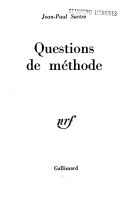Search for a Method
 |
|
| Author | Jean-Paul Sartre |
|---|---|
| Original title | Questions de méthode |
| Translator | Hazel Barnes |
| Country | France |
| Language | French |
| Subject | Marxism |
| Published |
|
| Media type | Print (hardcover and paperback) |
| Pages | 132 (original edition) 228 (1968 Vintage edition) |
| ISBN | |
Search for a Method or The Problem of Method (French: Questions de méthode) is a 1957 essay by Jean-Paul Sartre, in which he attempts to reconcile Marxism with existentialism. The first version of the essay was published in the Polish journal Twórczość; an adapted version appeared later that year in Les Temps modernes, and later served as an introduction for Sartre's Critique of Dialectical Reason (Paris, 1960). Sartre argues that existentialism and Marxism are compatible, even complementary, even though Marxism's materialism and determinism might seem to contradict the abstraction and radical freedom of existentialism.
Sartre's opening chapter discusses the relationship between Marxism and existentialism. Sartre sees Marxism as the dominant philosophy for the current era of history and existentialism as a reinforcing complement. Most of the chapter discusses how existentialism fails to stand on its own as a school of thought while Marxism has become corrupted by the Soviets and other orthodox Communists who abuse the system of thought. Sartre sees existentialism as a reaction to this abuse.
Sartre opens his first chapter by defining philosophy. He argues that there are many philosophies and that a current, active philosophy unifies all current knowledge and represents the "rising" class becoming conscious of itself. Sartre breaks modern philosophy down into three eras: mercantile John Locke and René Descartes, industrial Immanuel Kant and Georg Wilhelm Friedrich Hegel, and contemporary Karl Marx. Sartre classifies existentialism as an ideology instead of a philosophy since it failed to establish itself as an independent system of thought and did not establish itself as the conscious of a new class. Early existentialism, represented by Søren Kierkegaard, did not stand on its own as a unified system of thought. Instead, Kierkegaard's work stood only as the opposition to Hegel's. The existence of Kierkegaard's thought depended on the existence of Hegel's since it is solely a reaction to it.Karl Jaspers also failed to establish existentialism in a place of historical importance since his theories are directed inward, toward the self instead of outward, to society.
...
Wikipedia
